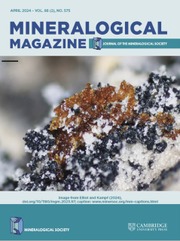Article contents
Sintering and crystal growth of magnesia in the presence of lime and forsterite
Published online by Cambridge University Press: 05 July 2018
Summary
The densification of pure magnesia was examined along with mixtures containing 0·5 and 1·0 mol % of calcium oxide and forsterite. The sintering behaviour at temperatures between 1400 and 1800 °C was studied and measurements made of changes in shrinkage, porosity, bulk density, and grain size for sintering times of up to 8 h at sintering temperature. It was found that both the 0·5 and 1·0 mol % additions enhanced the sintering of pure magnesia in the temperature range 1500–1700 °C Increased grain growth was found for mixtures containing forsterite but little change occurred for mixtures containing lime. Examination of the grain growth data showed that the mixtures obeyed a relationship: Time at temperature × Constant = (grain size)n, where n = 2 for the grain growth of pure magnesia and mixtures containing lime, but n = 3 for mixtures of magnesia with additions of a silicate such as forsterite. A value of 78 kcal/mole was obtained for the grain growth of pure magnesia, which agrees with other researches.
The extent of the solubility of lime in periclase for each lime-magnesia mixture at each temperature was also examined using electron probe analysis and related to the sintering behaviour observed for these mixtures.
- Type
- Research Article
- Information
- Copyright
- Copyright © The Mineralogical Society of Great Britain and Ireland 1970
References
- 4
- Cited by


